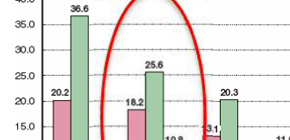
A higher risk of death on and around birthdays demonstrated
Will lead to suicide prevention
Two hypotheses have been advocated regarding risk of death on and around birthdays: (1) the “death postponement" hypothesis and (2) the “birthday blues” hypothesis.
Under the “death postponement" hypothesis, if people are more likely to live until a meaningful date, such as their birthday, it is expected that the number of people who die on their birthday will decrease. On the contrary, under the “birthday blues” hypothesis, if people cannot celebrate personally significant days such as birthdays in a way that they had anticipated, mental stresses, such as a feelings of loneliness, increase, so it is expected that the number of people who die on their own birthday will increase as well.
Recent studies in Europe and the U.S. advocate the latter hypothesis, but it was unclear that there was the same tendency in Japan, with its differing culture. Suicide is a serious social problem characterizing contemporary Japan, making suicide prevention an urgent issue.
Associate Professor MATSUBAYASHI Tetsuya, Osaka School of International Public Policy, Osaka University and Research Assistant Professor UEDA Michiko at Syracuse University focused on the relationship between date of birth and date of death, analyzing national mortality data from 1974 to 2014. This data included all individuals who died from suicide and accidents during that period.
This group’s statistical analyses of this data revealed that the number of deaths by suicide or accident was particularly high on birthdays compared to any other dates. When examining data by cause of death, birthdays had the strongest effect on suicides in particular, seeing a 50 percent increase in deaths by suicide over any other day of the year.
The increase in deaths on birthdays was observed in other countries, but it had not been clarified that the same was true for Japan. This group’s study suggests that when individuals with a high risk of suicide reach their birthday, their family and friends, as well as medical professionals, should pay extra attention to those individuals. The results of this group’s study have great social significance in considering how to prevent suicide.
Abstract
This study examined whether people have a higher risk of death on and around their birthday using a large national mortality data. We examined 2,073,656 death records of individuals who died in Japan from major external causes between 1974 and 2014. Poisson regression analysis showed that people were more likely to die on their birthday than on any other calendar day by means of suicide, traffic accidents, accidental falls, drowning, and choking. For suicide cases in particular, people are 50% more likely to die on their birthday compared to any other dates. Excess deaths on birthdays were observed regardless of gender, marital status, and age-at-death subgroups. For suicide deaths, our results provided strong support for the “birthday blues” hypothesis that predicts excess deaths on birthdays. With regards to traffic accidents and other unintentional accidents, however, our results suggest that excess deaths on birthdays may be related to birthday celebrations. For the elderly population, our analysis indicates that special activities associated with birthday celebrations, which often involves going out to consume festive food and drinks, may be contributors to a sudden increase in the number of accidental deaths on their birthday. In contrast, a notably sharp increase in the number of motor vehicle accidents was observed for individuals in the 20s on their birthday, which may be attributable to birthday celebrations that involved both driving and drinking.

Note: The frequencies of deaths by six external causes (suicide, transport accident, falls, drowning, and choking) shown. The sample includes individuals who died by these six causes between 1974 and 2014 in Japan. The horizontal axis ranges from -182 to +182 on the days leading up to or following the birthday. Those who died on their birthday yielded a value of zero, and those who died after their birthday generated a positive value. Similarly, those who died before their birthday produced a negative value. For each value of this variable (-182 to +182), we aggregated the frequency of individual death records for all deaths from external causes as well as deaths separately by six causes.
To learn more about this research, please view the full research report entitled “ Suicide and Accidents on birthdays: Evidence from Japan ” at this page of the Science Direct website.
Related link
